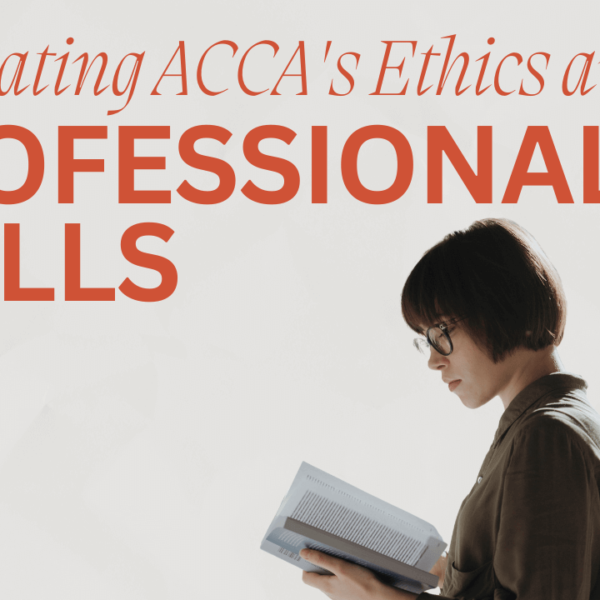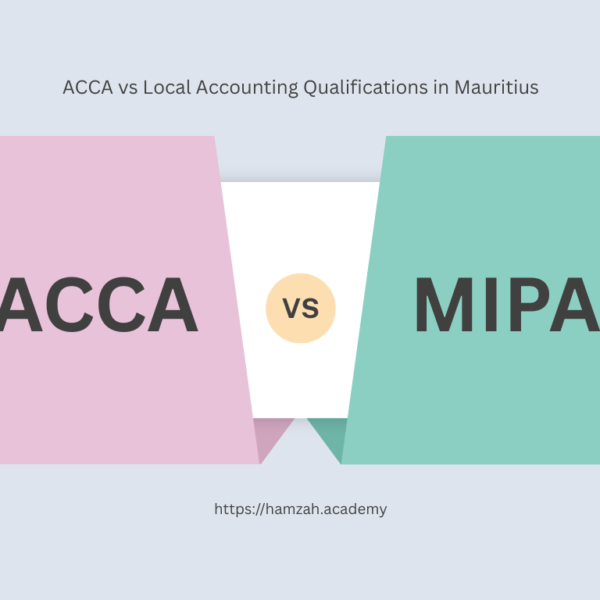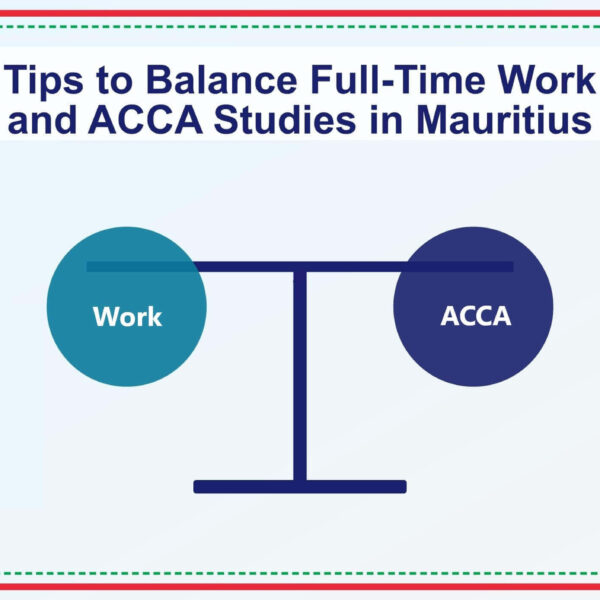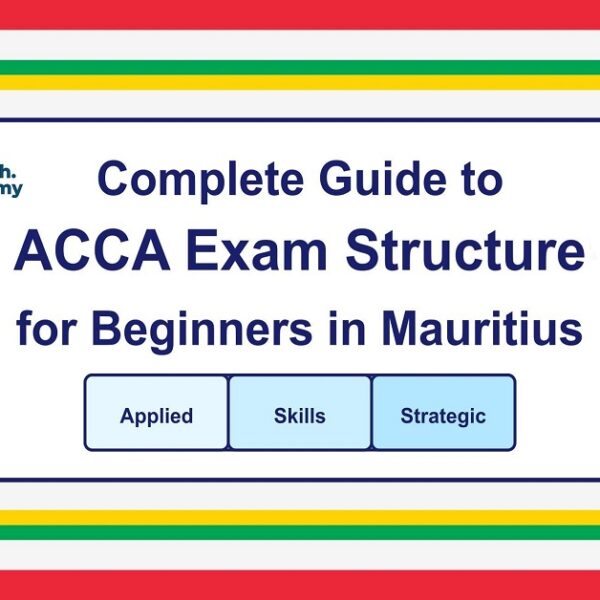
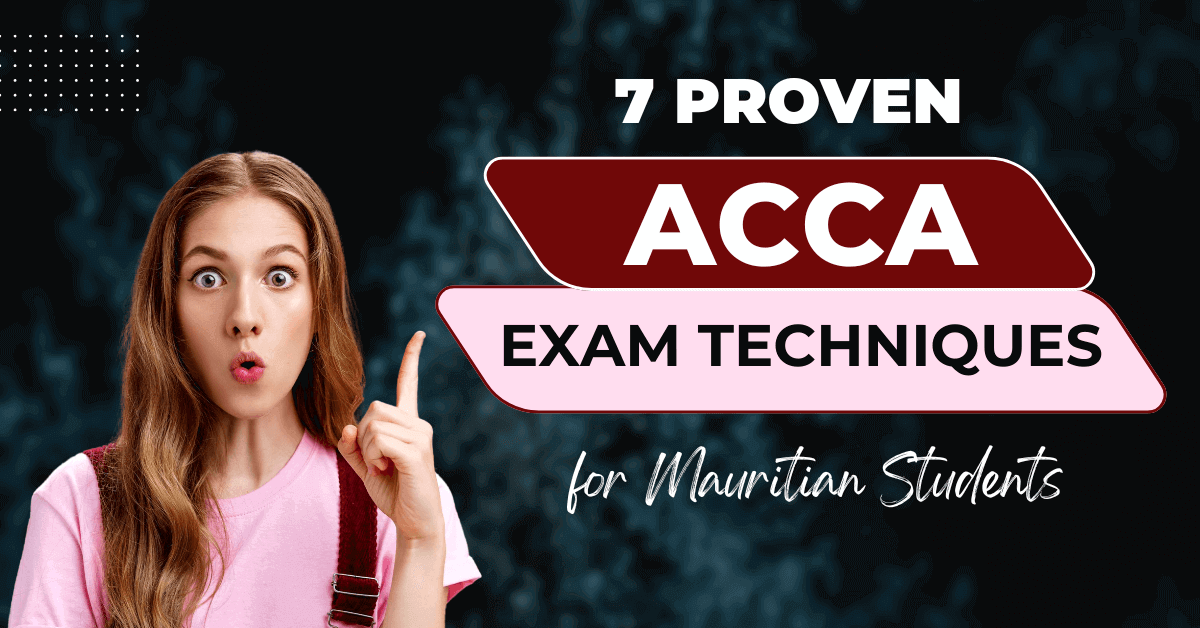
Preparing for ACCA exams requires more than understanding the content. It demands strategic approaches specifically tailored to the examination format. Effective exam techniques are essential for success for Mauritian students, who often balance full-time work with studies. Here are 7 proven strategies that have helped Mauritian ACCA candidates excel in their examinations.
Master the CBE Environment for Applied Knowledge and Skills Papers
Computer-based exams (CBEs) are now standard for all Applied Knowledge papers and many Applied Skills papers in Mauritius. To maximize your performance:
Practical Techniques:
- Before your exam, familiarize yourself with the CBE interface using ACCA’s practice platform.
- Practice using the on-screen calculator available at Mauritius exam centers rather than relying on physical calculators.
- Learn keyboard shortcuts to save time during the exam.
- Practice using the highlight and strikethrough functions to mark important information and eliminate incorrect options.
2. Strategic Time Allocation for Mauritian Testing Conditions
Time management is crucial, especially considering the specific testing conditions in Mauritius:
For Objective Test Questions:
- Allocate 1.8 minutes per mark (slightly less than the standard recommendation due to Mauritius’s occasionally unstable internet connections).
- Flag questions you’re uncertain about rather than spending too much time on them.
- Reserve 5 minutes at the end to review flagged questions.
For Constructed Response Questions:
- Read all questions first before starting to answer (5-7 minutes).
- Allocate time-based on marks: 1.8 minutes per mark.
- Reserve 10 minutes for the final review.
3. The “CEE” Technique for Professional Level Papers
For Strategic Professional level papers, Mauritian successful candidates recommend the “CEE” approach:
C – Conceptual Understanding
- Identify the relevant technical concepts from the ACCA syllabus.
- State the accounting/finance/tax principle that applies.
E – Evidence from Scenario
- Apply the concept to the specific scenario details in the question.
- Reference particular information from the case study.
E – Evaluation of Implications
- Discuss the consequences of your analysis.
- Provide recommendations appropriate to the Mauritian business context.
This structured approach ensures that you demonstrate technical knowledge while applying it to the scenario—a critical skill for success in case study-based Strategic Professional papers.
4. Effective Use of Pre-Seen Materials for Strategic Business Leaders
The Strategic Business Leader (SBL) exam includes pre-seen materials released before the exam. Mauritian students can leverage these effectively by:
Pre-Exam Preparation:
- Research similar organizations in the Mauritian context to understand relevant business environments.
- Prepare analysis frameworks (SWOT, PESTEL, Porter’s Five Forces) applicable to the pre-seen scenario.
- Form study groups with other Mauritian candidates to discuss potential angles and approaches.
During the Exam:
- Quickly identify which aspects of your pre-prepared analysis are relevant to the specific exam questions.
- Customize your analysis to address the particular requirements rather than reproducing generic frameworks.
5. Maximizing Marks with the “RTFQ” Principle
Many Mauritian students lose marks by not directly addressing question requirements. The “Read The Full Question” (RTFQ) principle helps combat this:
Implementation Steps:
- Underline or highlight action verbs (discuss, evaluate, calculate, advise).
- Identify the specific technical area being tested.
- Note the particular context or scenario details that need addressing.
- Check the mark allocation to determine the depth required.
Example Application:
- “Evaluate (action) the financing options (technical area) available to Mauritius Sugar Enterprises Ltd (context) for its expansion project. (20 marks)”.
- This requires comparing multiple financing options relevant to a Mauritian sugar company, with significant depth due to the high mark allocation.
6. Strategic Approach to Open-Book Exams
For papers like Advanced Taxation (ATX) that allow reference materials, Mauritian students need a strategic approach:
Before the Exam:
- Create a comprehensive but accessible reference system (Mauritius Tax Acts sections, relevant case law).
- Use color-coded tabs for quick navigation.
- Prepare summary sheets of key tax rates and allowances specific to Mauritius.
- Create flowcharts for complex procedures (e.g., corporate restructuring tax implications).
During the Exam:
- Limit reference material use to specific technical details only.
- Don’t waste time reading extensive background information.
- Use your reference material primarily for verification, not learning.
7. Applying the “Three Pass” Approach to Case Studies
For complex case studies in papers like Strategic Business Reporting (SBR) and Advanced Audit and Assurance (AAA), successful Mauritian candidates recommend the three-pass approach:
First Pass: Information Gathering (15% of allocated time)
- Read the entire case quickly.
- Highlight key facts and issues.
- Note financial information and unusual items.
- Identify stakeholders relevant to the Mauritian business environment.
Second Pass: Planning (15% of allocated time)
- Map each requirement to relevant case information.
- Identify applicable technical knowledge.
- Structure your answer with clear sections.
- Allocate time for each section based on marks.
Third Pass: Detailed Response (70% of allocated time)
- Write comprehensive answers following your plan.
- Ensure balanced coverage of all requirements.
- Apply technical knowledge to case specifics.
- Include relevant Mauritius business context where appropriate.
HAMZAH Academy’s Exam Success Program
At HAMZAH Academy, we support Mauritian students with:
- Exam Technique Workshops: Regular online sessions focusing on the abovementioned techniques.
- Mauritius-Specific Mock Exams: Timed practice with questions contextually relevant to Mauritian business environments.
- Personalized Feedback: Detailed performance analysis highlighting areas for technique improvement.
- Last-Minute Clinics: Pre-exam sessions focusing on common mistakes made by Mauritian candidates.
Mauritian ACCA students can significantly improve their exam performance with ACCA coaching in Mauritius, combining proven techniques with comprehensive technical knowledge. Our approach has helped Mauritian candidates achieve pass rates consistently above global averages across all ACCA papers.
Start implementing these techniques today with HAMZAH Academy’s structured ACCA preparation program explicitly tailored for Mauritian professionals.

